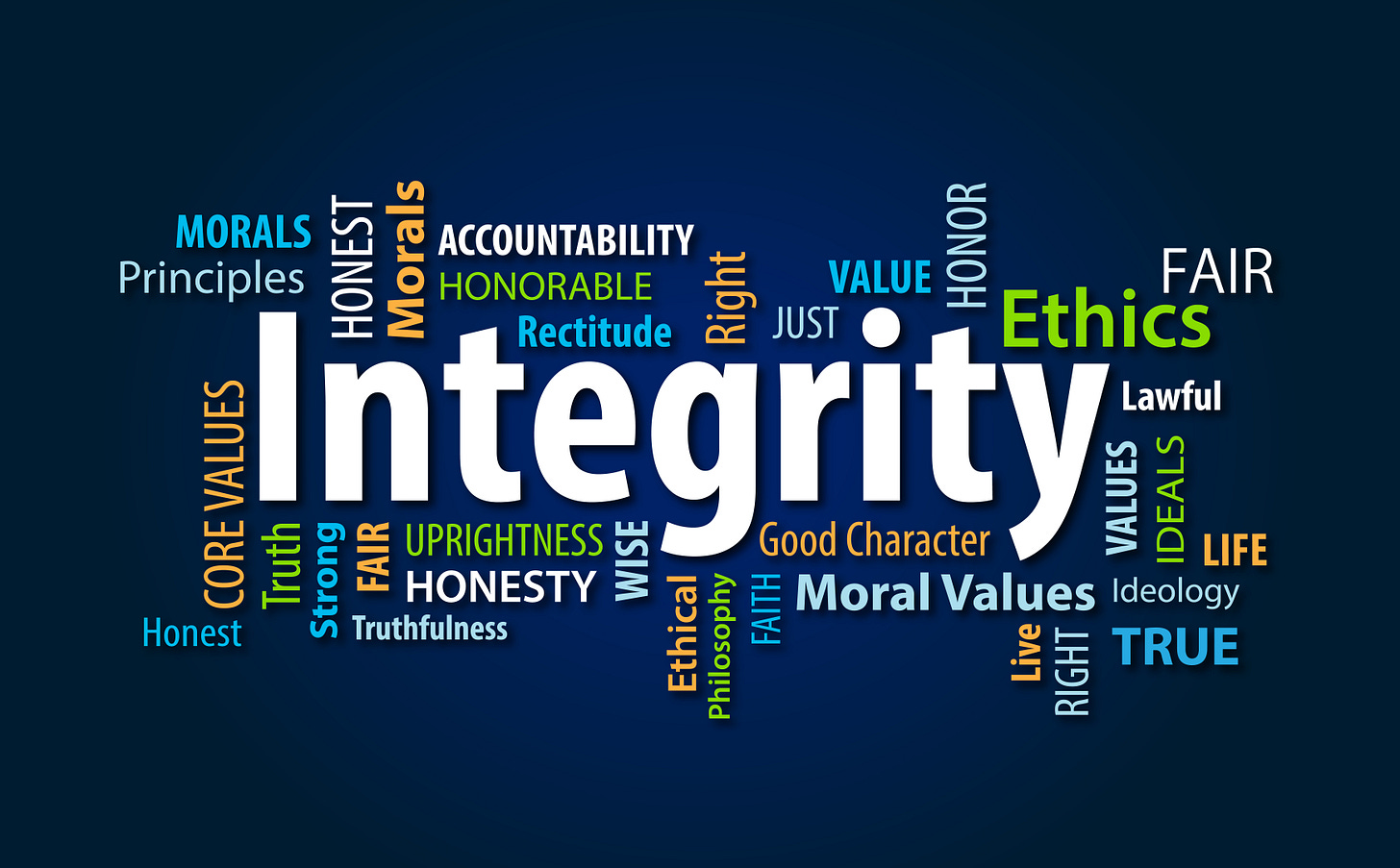Integrity Isn’t Lost in Big Ways, But Small Ones
It’s the overlooked promises and shortcuts that quietly shape who we become.
ID 15952559 | Integrity © Cammeraydave | Dreamstime.com
Integrity grows like a living thing—strengthened or weakened by the smallest acts of care.
Integrity Isn’t Lost in Big Ways, But Small Ones
It’s the overlooked promises and shortcuts that quietly shape who we become.
Earlier, I wrote about lapses in integrity and why they matter (see article below). Since then, several readers have asked me: What about the little ones—the lapses that maybe only I notice?
The truth is, most of us don't compromise our integrity in one grand, visible failure. More often, we lose it in the small, ordinary moments: the promise not kept, the shortcut taken, or the truth softened.
Often, the lapses I notice most are the ones in promises I make to myself: walk 7,000 steps today, eat 1,400 calories to stay at a healthy weight, go to bed early to get the sleep I need, or phone my sister or a friend to keep in close contact with people I love. It's so easy to let these commitments slip.
The hidden cost is that those "small" slips not only change how others perceive us, they slowly alter how we perceive ourselves.
And there lies the dilemma. My self-perception is deeply tied to how I view my actions and choices. If I quietly disappoint myself, I begin to chip away at the very trust I need to live authentically.
When I examine lapses in integrity again, they fall into three categories that warrant closer examination.
1. The Hidden Cost of Small Lapses
We often rationalize minor breaches in integrity by thinking, This doesn't hurt anyone.
But even the tiniest lapse—a promise brushed aside, a toilet paper roll left empty, a "little white lie" told to smooth an awkward moment—carries weight.
These moments quietly signal disregard for others. And when repeated, they create an environment where shortcuts and excuses become normal.
In the workplace, this kind of culture can quietly erode trust. In our personal lives, it can leave the people closest to us wondering if our words really match our actions.
Internally, they make us question whether we can trust our own word.
Integrity isn't only about avoiding significant failures. It's about noticing how the tiniest actions set the tone for trust.
2. Self-Integrity vs. Public Integrity
In my earlier article (see below in full), I focused on both workplace and interpersonal examples. However, another layer of integrity that deserves equal attention is self-integrity.
It's one thing to keep a commitment to a colleague or a friend. It's another to keep a commitment to yourself—getting up to write when you said you would, honoring your health plan, or simply following through on what you privately promised yourself yesterday.
When you repeatedly break commitments to yourself, confidence and self-trust slowly erode. It becomes easier to excuse the next lapse, and harder to believe in your own ability to hold steady with your self-promises.
Integrity begins privately, long before it's visible to others.
3. Rebuilding Integrity After a Lapse
Here’s the good news: everyone slips. What matters is what happens afterward.
Naming the lapse, apologizing, and choosing differently restores integrity far more quickly than trying to cover it up.
Leaders in particular can turn a lapse of integrity into a moment of trust-building if they acknowledge it openly.
A lapse doesn't have to define you. But denial almost always does.
Closing
Integrity isn't a lofty ideal; it's the lived thread in daily choices. Every small action carries weight in how others experience us and in how we experience ourselves.
As you move through this week, take note of one area where you can maintain your stability. Keep a promise, tell the small truth, or make amends for a slip.
Those micro-moments, invisible to most, are the ones that define your integrity.
Lapses in Integrity—Why They Matter
The Importance of Addressing Integrity Breaches
Integrity is a crucial life value, but what does acting with integrity mean? While many people believe everyone knows right from wrong, the reality is more complex. People often disagree on what constitutes right and wrong. That's why integrity and business ethics are constantly debated, from news headlines to casual office conversations.
Common sense, often considered a driver of integrity, is not as universal as you might hope. What seems evident to you might be a gray area for someone else. Reaching an ethical consensus can be a challenge.
As a result, acting with integrity in business doesn't come naturally to everyone. Building a solid foundation of integrity often requires actively teaching and reinforcing ethical practices in everyday work. People need real-life examples of integrity in action.
And, as our world becomes increasingly complex, finding the correct answer that satisfies most stakeholders—employees, customers, potential employees, shareholders, and board members—often requires a balanced approach.
When you operate globally, people in other countries may have different ideas about what is essential for integrity and ethical practices. Countries have varying ethical and social norms, making navigating these complexities with integrity even more crucial.
Integrity Challenges at Work
People walk a tightrope when it comes to ethical choices in the workplace. While running a quick personal errand during a break might seem harmless, what about using company resources for an individual project or filing fudged expense reports? The line between harmless and harmful can be blurry.
Do people consider whether their choices are ethical? An individual might think, I work hard, so spending an hour on personal business online is okay. Or, I'm underpaid, so it's OK if I fill in my time card to get a bit of overtime pay. They may not consider these choices wrong, as they can justify why they do what they do.
Think about these scenarios that happen in organizations every day. These scenarios demonstrate a range of integrity levels, from minor ethical breaches to serious misconduct, each of which can impact the trust and functionality within an organization.
Consider these ten challenges to integrity.
An employee surfs the web to shop for personal items during company time.
A plant manager decides to ship a product to a customer even though they know the parts have a quality problem because the problem doesn't affect the part function, and the customer probably won't notice.
A manager shares personal information an employee confided with other employees. They rationalize that the other employees will be more sympathetic to the employee’s problems.
An individual spends several hours a week on their iPhone talking with their children, associated caregivers, schools, and friends.
A salesman marks parts as sold in the company database, thus depriving others of the ability to sell the parts, even though their sale is uncertain.
A manager shares essential company information with a competitor for potential gain.
A store manager misrepresents the quality or functionality of an advertised sale item.
An employee uses the last of a toilet paper roll in a bathroom cubicle and leaves without replacing it for the next person.
An employee takes office supplies home to stock their home office.
A finance officer accounts questionably for purchases and expenditures.
Every business encounters these situations and similar ones. You need to make sure your business standards are clear.
Integrity Challenges in Life
Breaches of integrity can also occur in your personal life, affecting relationships, trust, and your personal growth. Here are ten examples of how integrity can be compromised outside of a professional setting. You may not have considered them in terms of demonstrating integrity, but integrity is inherent in each one.
When you get home from the grocery store, you discover you haven’t been charged for a steak. You decide to keep it because the store won’t notice anyway.
You engage in a secret, online relationship with someone, not your spouse or partner.
You promised to help a friend by watering their houseplants while they were on vacation. You skip watering by rationalizing that the plants will be fine if you miss them just once.
You realize the cashier has given you an incorrect amount of change in your favor when you purchase an item, and you decide no one will ever know and keep it.
You wake up late for work and call in, telling your manager that your baby is sick and you need the rest of the morning off to deal with the situation.
A friend shares confidential information with you, and you break their trust by gossiping about it with others.
You work in a hybrid workplace, where the expectation is that you will work 40 hours from anywhere. You find other things to do several days a week, thus shortening the time you spend on work for your employer.
A part of your lunch spills on a lunchroom table. Rather than wiping it up so the next person has a clean lunch space, you decide the janitor will get it in their nightly cleaning.
You tell a friend you can’t come over for dinner because you have plans for the evening when you don’t want to go.
You commit to completing a project but find twenty reasons to justify not following through.
So, before you relegate the subject of integrity to the touchy-feely, head-in-the-clouds worlds of philosophy, religion, or academia, consider the potential positive impact on your organization of addressing integrity as a personal and business essential.
Conclusion About Integrity
While often viewed as a lofty ideal, integrity is deeply practical and essential in both professional and personal realms. It influences trust, reputation, relationships, and overall functionality in your life and organization.
By acknowledging the complexities of ethical behavior and actively promoting a culture of integrity, organizations can navigate challenges more effectively. This will ensure long-term success and a positive work environment.
Your presence here means more than I can say. Thank you for being part of ValuesCrafting. Every time you read, reflect, and put these ideas into practice, you’re helping create a world where values guide actions—and that’s something worth sharing.







Susan - I love how you highlight that integrity isn’t usually lost in dramatic collapses, but in the smaller choices we often overlook. So true! Your point about self-integrity particularly hit home: those small promises we break to ourselves can slowly erode self-trust in ways no one else sees. I also appreciate your framing of integrity as something living, shaped daily in small acts of care. You remind us that rebuilding integrity is about noticing, naming, and re-choosing. Thank you for for writing this and doing so with so much compassion. It matters.